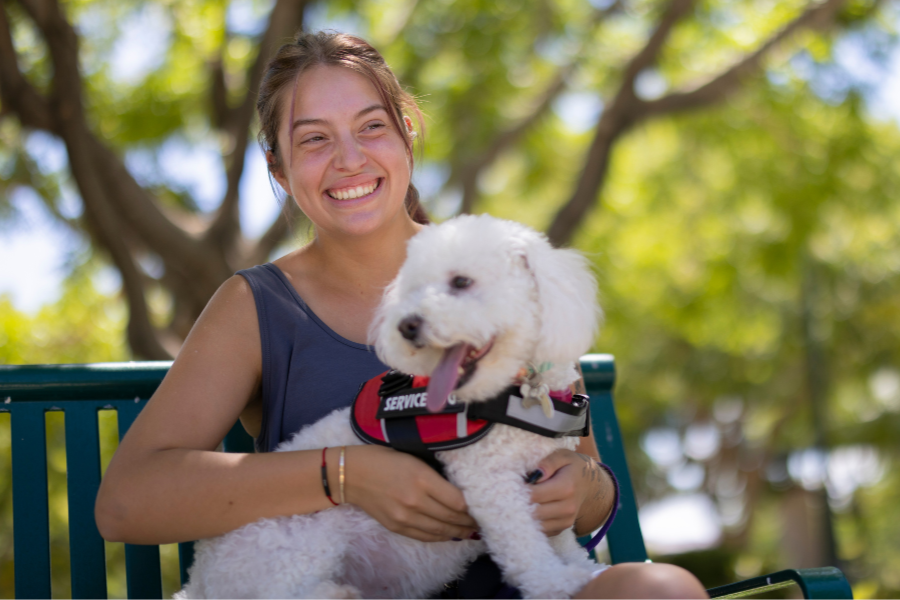
What Are My Rights as a Handler of a Psychiatric Service Animal? Your Questions Answered
- Published on:
- By: ASP Team
If you’re asking, “What are my rights as a handler of a psychiatric service animal?”, you’re not alone.
This is a vital question for anyone who depends on a psychiatric service animal (PSA) to navigate everyday life. Fortunately, federal laws like the Americans with Disabilities Act (ADA) and the Fair Housing Act (FHA) offer clear protections for PSA handlers—ensuring access, fairness, and respect in public spaces, housing, employment, and beyond.
At American Service Pets, we believe every handler deserves clarity and confidence when exercising their rights. Let’s explore your legal protections, what they mean in real-life scenarios, and how to ensure those rights are respected.
What Is a Psychiatric Service Animal (PSA)?
A psychiatric service animal is a dog (or, in rare cases, a miniature horse) trained to perform specific tasks that help a person with a psychiatric disability. These tasks may include:
- Interrupting panic attacks
- Reminding the handler to take medication
- Waking a person from night terrors
- Grounding a person experiencing dissociation
- Creating physical space in crowded areas
- Performing deep pressure therapy
Unlike emotional support animals, PSAs are classified as service animals under federal law, meaning they are granted broader legal protections and access rights.
Your Rights Under the Americans with Disabilities Act (ADA)
The ADA is a federal civil rights law that prohibits discrimination based on disability. Under the ADA, you and your PSA are granted essential protections in public life. Here’s what that includes:
1. Access to Public Places
You have the legal right to bring your PSA into nearly all public areas, including:
- Restaurants and cafés
- Retail stores and malls
- Hotels and motels
- Theatres and museums
- Parks and public transportation
- Medical offices and hospitals
- Schools and universities
- Government buildings
The key requirement is that your animal must be trained to perform a specific task related to your condition—not just provide comfort or emotional support.
Get Your ESA Today
2. Limited Questions from Staff
When entering a public place with your PSA, staff may only ask two questions:
- Is the animal required because of a disability?
- What task has the animal been trained to perform?
They cannot ask about your diagnosis, request documentation, or require your animal to wear a vest or ID badge. You are not obligated to disclose your condition or provide proof of training.
3. No Breed Restrictions
Under the ADA, breed cannot be used as a reason to deny access to your PSA. Whether your service dog is a Chihuahua or a German Shepherd, the focus is on the animal’s training and behavior, not appearance.
Your Housing Rights Under the Fair Housing Act (FHA)
The Fair Housing Act protects your right to live with your psychiatric service animal, even in places that typically ban pets.
1. Reasonable Accommodation
Landlords and property managers are legally required to provide reasonable accommodation for individuals with disabilities. This includes allowing your PSA to live with you in:
- Apartments with no-pet policies
- Condos or townhomes governed by HOAs
- Student housing or co-ops
2. No Extra Pet Fees or Deposits
You cannot be charged pet rent, a pet deposit, or extra cleaning fees solely because of your service animal. However, if your animal causes actual damage to the property, the landlord may charge you for repairs.
3. Verification Limits
While housing providers may ask for verification of your need for accommodation, they cannot ask for detailed medical records or require a specific certification. In most cases, a simple letter confirming your disability-related need is sufficient.
Flying With Your PSA: What You Should Know
The Air Carrier Access Act (ACAA) governs your rights when flying with a psychiatric service dog. Airlines are required to allow trained PSAs to fly in the cabin at no additional charge.
Guidelines You Should Follow:
- Your dog must remain under your control at all times—either on a leash, harness, or tether, or via voice commands if those tools are not feasible.
- Airlines may require you to submit a completed DOT form (Department of Transportation Service Animal Air Transportation Form).
- Your animal must fit within your foot space and not pose a safety or health threat to other passengers.
The rules differ slightly by airline, so it’s wise to check ahead and allow extra time at the airport for check-in.
Workplace Rights: Service Animals and Employment
Under the ADA, you may be entitled to bring your psychiatric service animal to work as a reasonable accommodation for your disability.
Here’s What You Should Know:
- You must request the accommodation through the appropriate HR or ADA coordinator at your workplace.
- Employers cannot deny your request without attempting to make reasonable accommodation.
- They are not allowed to ask for your diagnosis, only if you need the animal for a disability-related reason.
Note: The workplace is not treated the same as public spaces—advance notice and a formal accommodation process are usually required.
Responsibilities That Come With PSA Rights
With rights come responsibilities. You must ensure your service animal is:
1. Under Control at All Times
Your dog must be leashed, tethered, or under voice control. Disruptive or aggressive behavior—barking excessively, lunging, or biting—can lead to removal from public spaces.
2. Housebroken and Well-Behaved
Even though the law protects your right to access and housing, your PSA must meet basic behavior standards. Accidents indoors or disruptive conduct could void those rights.
3. Vaccinated and Licensed
You are responsible for keeping your service animal current on vaccinations and licensed according to local animal control laws. Some states may require proof if there is a health or safety concern.
Debunking Common Myths About PSA Handler Rights
Let’s clarify some common misconceptions:
- Myth: You must register or certify your service animal with the government.
Truth: There is no legal requirement for registration or certification under the ADA.
- Myth: Service animals must wear a vest or identification badge.
Truth: Identification gear is completely optional and not required by law.
- Myth: Emotional support animals (ESAs) have the same rights as psychiatric service animals (PSAs).
Truth: Only trained psychiatric service animals are granted full protections under the ADA and FHA—emotional support animals do not have the same legal rights.
The Importance of Knowing Your Rights
Understanding your legal rights isn’t just useful—it’s empowering. These protections:
- Ensure you have access to services and environments that support your mental health.
- Guarantee fair treatment in housing and employment.
- Shield you from discrimination, unnecessary fees, or intrusive questions.
- Give you the ability to stand up for yourself and others in similar situations.
Unfortunately, misunderstandings about these rights still occur, even among landlords, business owners, and public venue staff. That’s why staying informed is essential.
If your rights are ever violated, you have options: file a complaint with the Department of Justice or HUD, or consult legal counsel when needed. Knowledge is your greatest tool for advocacy and fairness.
Get Support From a Trusted Advocate
At American Service Pets, we’re committed to helping individuals live freely, confidently, and independently with their psychiatric service animals.
From providing access to essential tools and resources to guiding you through the process of verification and documentation, we’re here to help every step of the way.
Whether you’re exploring your legal rights, preparing for a housing request, or simply want to understand how to protect yourself in public places—our team is ready to support your journey with compassion and clarity.
Final Thoughts
So, what are your rights as a handler of a psychiatric service animal? You have the right to live, work, travel, and participate in daily life without being discriminated against—thanks to strong protections under the ADA and FHA.
Your PSA is not just a companion; they are a vital part of your health and wellbeing. And you have every right to expect fair treatment and access in return.
Stay informed. Stand your ground. And always know—you are not alone in this journey.

The benefits of an Emotional Support Animal certification and a Psychiatric Service Dog certification are drastically different. Fortunately for you, American Service Pets’ network of active board certified doctor or other licensed mental health providers can help you find the right path to certification. To find out whether you need an ESA or PSD letter, take our easy, three-step Pet Owner Survey!
More Great Resources





